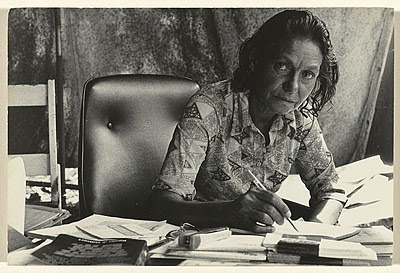Kath Walker, born 3 November 1920, was an Indigenous
political activist, poet, artist and public speaker. She later changed her name
to Oodgeroo Noonuccal in honor of her tribe (the Noonuccal tribe). She grew up
on North Stadbroke Island and lived there with her family, she dropped out of
School at age 13 to work as a domestic maid, at this time in her life Kath
Walker aspired to be a nurse but knew that her lack of schooling would impose
problems in completing a course for this profession. She then Joined the
Australian Women’s Army Service (RWAS) in 1941 where she served without
discrimination or prejudice and learned new skills. Kath and her husband joined
the communist party as they believed they were the only form of government
without racist views but then resigned when they discovered the lack of effort
towards ending racial discrimination. Kath Walker was an active campaigner for
civil rights and during the 1960s her work was flourishing, speaking and
promoting equality and writing many poes about her experiences and the
circumstances they were in. She passed away in 1993 at age 73 due to cancer.
·
Which Indigenous leaders have led the struggle
for rights and freedoms?
The civil rights movement in Australia would not have been
the same without some extremely brave, fearless characters of different
Aboriginal descent pulling together to fight for a cause that affected all
Indigenous Australians. Leaders that led these movements and struggles include
government officials, public speakers, educators, artists and writers.
Indigenous leaders included Vincent Lingiari who was the leader for the
Gurindji strike, Jack Patten and William Ferguson helped by writing up a
document outlining the Aboriginal peoples protests and demands that were then
passed on to the government. It might have been the leaders who organized all
the events but for anyone to participate was an act of bravery and defiance,
they may not be ‘leaders’ but they demonstrate that if you strongly believe you
can change history.
·
What rights and freedoms have Indigenous
Australians fought for since 1945?
Mistreatment of Indigenous Australians has been a matter
since the settlement of White European people. With the arrival of promising
settlers after World War 2, so came the policies and governmental movements in
the hope of keeping Australia white. Although WWII was a devastating period of
history, it also, for those years of war, eradicated the difference of skin
colour and people were much less discriminative, although after the war,
Australia took a step backwards and now not only were they segregating people,
they were segregating those who had fought for the country. Problems facing the
Aborigines included the assimilation policy, removal of Aboriginal children
from their families, inequality between races and unrecognized land rights by
the government. Majority of these issues were inflicted by the Australian
government, working against the traditional land owners and in favour of the
White Australian immigrants/descendants. The Aboriginal community fought for
several rights and freedoms, in hope of making life better for future
generations. They fought against the policies set in place by the government
and pushed the idea of equal rights between races. These protests were majorly
successful and have been a great advance into multiculturalism and the
indiscriminative nation we are today. Kath Walker participated in the movement
by participating in marches and through her work as a poet and journalist.
·
What challenges do Australia’s Indigenous people
face today?
Although the gap between the Indigenous Australians and
White Australians has been minimized significantly, there are still challenges
facing the Aboriginal community today. These include remoteness, health,
education and employment. Majority of people of Aboriginal descent do live in
suburban/country towns and cities yet there are still a percentage of those
living in remote areas, this is the main reason for the challenges the Aboriginals face today. With living in a remote, central Australian town also
comes with lack of/uneasy access to health care such as hospitals; this
contributes to the fact that Aboriginals have the highest rate of poor health
amongst Australians. Since the referendum, education has been a targeted issue
on the agenda and since then education standards have been improved
dramatically but there is still a margin between the standards of
inner-city/suburban schools and inland schools mainly due to the lack of
qualified teachers in the area. This has also led to a greater percentage of
lower rated jobs and unemployment, as employers generally have a negative view
on the standards and level of education in Aboriginal communities. The most
significant challenges the Indigenous Australians face are unfortunately the
remoteness of Central Australia and the negative view of education and work
ethic in the industry.

No comments:
Post a Comment